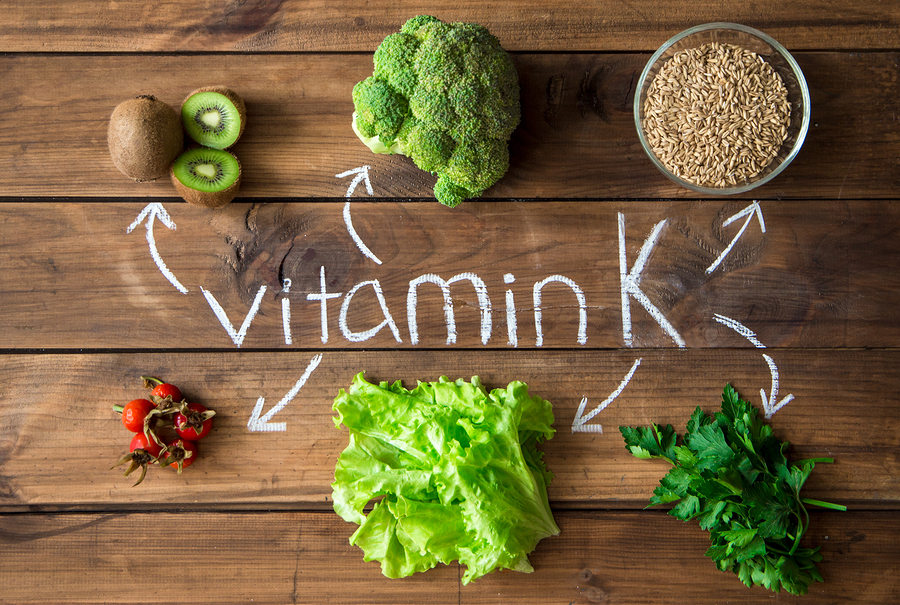As I was searching for my next health article the title Vitamin K Improves Glucose Metabolism caught my attention. And as I researched this topic I discovered that both forms of vitamin K improves glucose metabolism.
Yes, there are two main forms of this vitamin. Each form has a different overall function in your body.
Vitamin K1 (phylloquinone) helps to keep blood platelet cells from sticking together. Because of this, if you are on blood thinning medication, then your physicians will usually caution you about limiting your intake of this vitamin.
Vitamin K1 is found in green leafy vegetables like kale, spinach, collards, Swiss chard, turnip greens, mustard greens, parsley, romaine, and green leaf lettuce. You will also find this vitamin in Brussels sprouts, broccoli, cauliflower, and cabbage.
Vitamin K2 (menaquinone) is used by your body to regulate calcium levels in the blood stream. This vitamin helps to keep calcium in the bones where it belongs. And prevents the calcification of your soft tissues like your arteries, heart, lungs, and kidneys.
Vitamin K2 comes from animal and protein sources like natto, fermented soy, liver, cheese, egg yolks, dark chicken meat, grass feed beef, and butter.
In summary, vitamin K plays an important role in proper blood clotting, maintaining bone density, and preventing vascular calcification.
Certain drugs like statins actually lower vitamin K levels in your system. Which now makes sense to me since one of the side effects of statin drug usage is an increased risk of diabetes.
Vitamin K Improves Glucose Metabolism – What the Research Says
There have been several large scale studies examining this association between type II diabetes and vitamin K levels.
These studies have shown that any increase in vitamin K, whether it be from K1 or K2, is associated with a reduced risk for developing type II diabetes. For older adults the reduced risk was as high as 51 percent.
Think about that.
For older adults the potential reduction in type II diabetes could be as much as half the population group.
One study helped to quantify this improvement by showing that there was a 17% reduction in risk for type II diabetes for each additional intake of 100 mcg/day of vitamin K1.
Most of the benefit of vitamin K is in the form of improved glucose metabolism. Either by improving insulin sensitivity. Or by improving other factors that are associated with improved glucose metabolism like:
Gla Proteins – These proteins play a vital role in bone and mineral metabolism. Vitamin K helps to activate this group of proteins. This then improves your body’s ability to regulate its metabolism. They also improve your body’s ability to reduce abdominal fat, which can significantly alter your overall metabolism.
Adiponectin – This is a beneficial hormone used by your body to regulate the processing of sugars. Vitamin K can boost your body’s adiponectin levels in a positive way.
Now if you’re on blood thinning medications, then your doctor has most likely asked you to reduce your intake of any type of green leafy vegetables. This request will then lower your vitamin K1 levels and increase your risk for type II diabetes.
The good news is that vitamin K2 does not interfere with blood thinning medications. Which means that you can take either foods rich in vitamin K2 or supplement with a good vitamin K2 product.
This especially applies to anyone taking a statin drug. Not only do you need to supplement with a good CoQ10 product, but you should definitely add a good vitamin K supplement to your daily routine.
One of the better companies that produce good vitamin K supplements is LifeExtension. Here is a link to some of the products they offer in this area:
https://www.lifeextension.com/search#q=vitamin%20k&t=coveo4A2453FD&sort=relevancy
While medications are helpful in addressing certain health issues they usually have side effects. Proper vitamin supplements can help to offset these side effects. It’s good to know that vitamin K improves glucose metabolism to help reduce the risk for type II diabetes.

Leave a Reply
You must be logged in to post a comment.